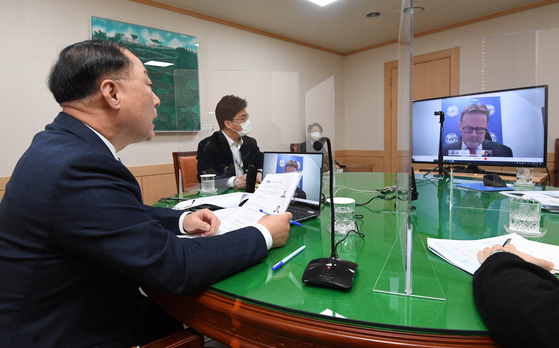
On the 27th, Vice Prime Minister Hong Nam-ki and Minister of Strategy and Finance are holding an interview with Andreas Bauer, head of the Korean Mission for the International Monetary Fund (IMF), on the results of the annual IMF consultations at the government office in Seoul. Ministry of Strategy and Finance
The International Monetary Fund (IMF) expressed a positive opinion about the Korean economy, saying, “It has the capacity to support additional selective support for workers and businesses that have suffered damage.” Regarding the discussion on the ban on short selling in the stock market, he said, “It is possible to resume” considering the domestic economic situation.
The IMF announced the results of its annual consultation with the Ministry of Strategy and Finance on the 28th, saying, “The Korean economy has relatively well overcome the novel coronavirus infection (Corona 19).” The IMF proposed to the Korean government to expand fiscal policy and ease monetary policy. The IMF said, “Even if the size of the fiscal deficit increases this year, we will be able to offset it with future fiscal soundness. There is room for additional support to manage the future economic recovery and inflation rate closer to the Bank of Korea’s goal.” . In the financial sector, he emphasized the need to manage household debts and recommended the transition to selective financial support to promote corporate restructuring and repayment capabilities.
The following is a brief question and answer at a video press conference by Andreas Bauer, head of the IMF mission.
- Some point out that, unlike the analysis of the IMF, excessive financial expansion could act as a burden in the future?
- “In the short term, what the Korean government should focus on now is to support the economy to recover from Corona 19. Currently, Korea has an idle economy, so the expansion of finances will help the economy recover. However, in the long run, the aging problem could be a pressure factor for Korea’s fiscal and national debt growth. We support the efforts of the Korean government to introduce fiscal rules to ensure fiscal sustainability. The 60% line suggested by the government through fiscal rules is appropriate.”
- Do you think there is a need for a system to compensate for the business losses of Korean self-employed people?
- “Economic recovery is in progress, but there is an uneven recovery by class. Most of the self-employed are the victims because they provide face-to-face services. Korea has a higher proportion of self-employed people than other OECD member countries, and it is necessary to relocate spending to self-employed in a crisis such as Corona 19. I think it is desirable to establish a permanent safety net for self-employed people in the future. However, research is necessary because it is difficult to grasp the income and sales information of self-employed persons.”
- What are your views on the discussion on the extension of the short selling ban?
- “In the case of the Korean market, it has stabilized after Corona 19, and the economic recovery is also progressing. We believe short selling will be possible again. We believe that short selling makes the market more active and allows investors to be more sensitive to risk. It is also important to protect individual investors and ensure that all market participants have an equal opportunity, but trying to secure an equal market through a total ban on short selling is a very blunt tool, which can entail significant costs in the future. ”
- Considering household debt, does it seem necessary to further cut the base rate at this point?
- “Considering the situation where inflation is below the government’s targets, I believe the benefits of additional monetary easing measures outweigh the risks. Although there is relatively little room for policy, I think there are still policy tools that the BOK can use. I do not recommend any measures specifically, but I think a cut in the base rate can be used as an alternative.”
Sejong = Reporter Seongbin Lim [email protected]
